Ducks, like chickens, are omnivores. So what do ducks eat? Typically, ducks eat foraged food including weeds, seeds, grasses, slugs, and other pests. Ducks also eat natural, homemade feed or commercial feed. To know what ducks want and need to eat, look no further than a wetland in your local park.
There, in the early morning, you’ll be sure to see wood ducks and mallards dabbling in the shallows, waddling through tall grasses, or briefly diving below the water. These wild birds are able to totally satisfy their needs with the stuff that comes from the land itself.
If you look at what fills those wild ducks’ bellies, you’ll find insect larvae, worms, acorns, tadpoles, aquatic invertebrates, slugs, weeds, grass, sedges, and whatever seeds and grain they are able to find.
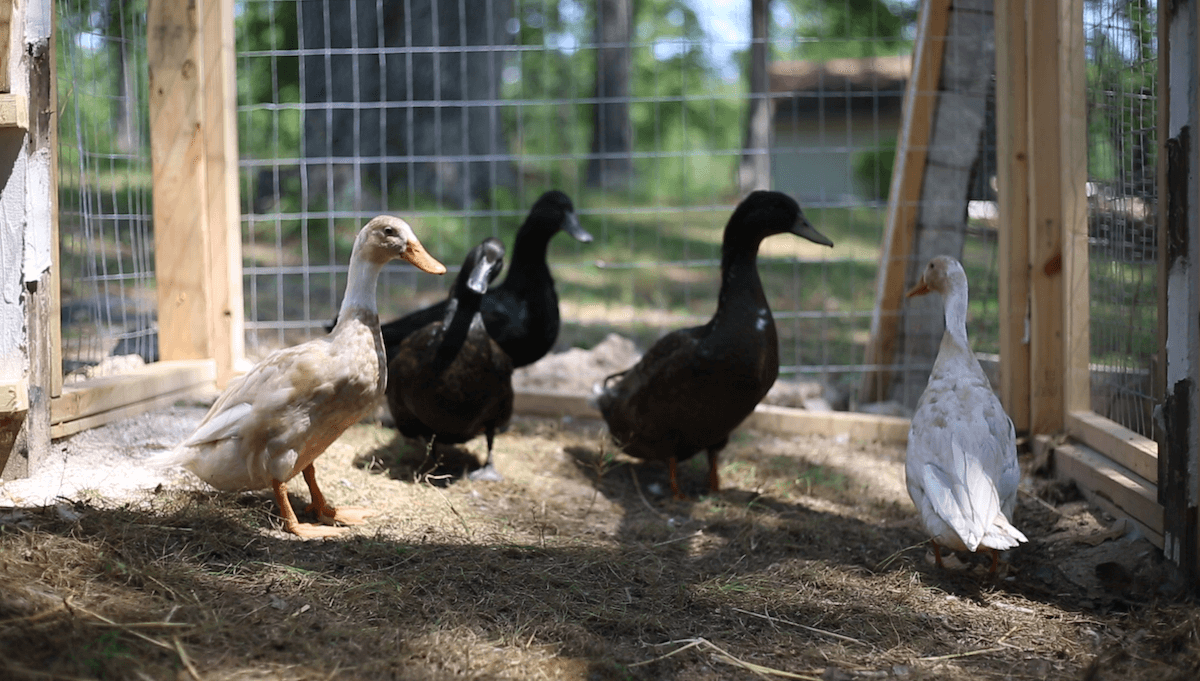
The good news is, domesticated ducks are pretty close to their wild cousins in terms of needs, and if allowed to follow their forage-inclined design, are quite easy to feed. The same grasses, bugs, and seeds eaten by wild ducks are just as nutritious and tasty to their domesticated counterparts.
“Under natural conditions, mallard-derived ducks satisfy 90 percent of their nutritional needs by eating vegetable matter; the remaining 10 percent comes from animal matter, such as mosquitoes, flies, and tadpoles” (Damerow, 92). Give ducks access to enough protected space, and feeding them could be as simple as offering them a handful of seeds in the evening to make sure they come back to their pen!
Ducks are a fantastic addition to a homestead, offering enriching manure, super-mega-jumbo eggs, flavorful meat, and endless antics to the acreage they inhabit. If you are dreaming of watching your own flock of waddling, quacking, adorably awkward birds bumbling through the grass, then you need to know how to feed them well.
What Should I Feed My Ducks?
First and foremost, ducks need access to lots of fresh water, as well as the sand and grit that will allow them to process any food they eat. All of the following recommendations are written with those considerations already in mind.
Let Them Forage
The best option for your ducks’ health and happiness is allowing them to feast on forage. Not only does this option provide all the balanced minerals, natural sources of calcium, and nutrients to keep a duck in peak shape, but it helps cut down on the pest population of your homestead.
Foraging also provides the ducks with mental stimulation and exercise. There are few sights more relaxing and endearing than a flock of ducks meandering through tall grass to play in the pond.
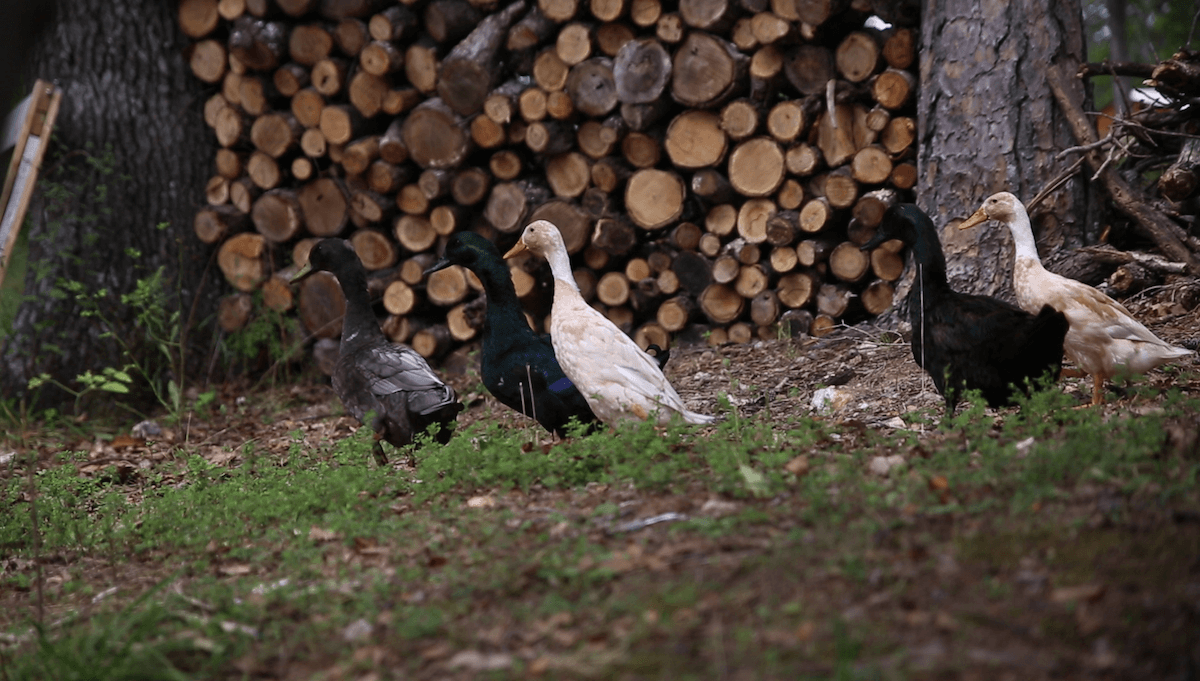
Even if you don’t have endless acres, you can still let your ducks eat these healthiest of foods! Allowing ducks to waddle through a developed garden will take out unwanted weeds and pests without the scratch-damage that chickens would make. Just make sure that there aren’t tender seedlings or berries that you hope to protect—ducks will happily eat those as well.
Natural Feed
If you don’t have the space to allow ducks to forage all day, you can still offer them the benefit of fresh veggies and bugs. Grass clippings, acorns, and garden weeds from unsprayed areas are fantastic for them—and there’s no way for them to overeat on greens. Ducks won’t eat wilted or dried greens, so floating leaves in water will both give them something to do and will make sure they don’t waste their food.
Watermelon rinds, vegetable scraps from cooking, any salad green, fruit peels, extra oatmeal, scrambled eggs (shells and all!), and even meat trimmings can all be a fantastic supplement to a duck’s diet.
https://www.instagram.com/p/Blmec2pldui/?tagged=duckfood
Whole grain seeds are also a great side dish for your ducks. Unlike pelleted food, they don’t spoil when they get wet or forgotten—they simply sprout into fantastic greens, which your ducks will happily chomp down.
As for the meaty element, minnows, crickets and meal worms can be easily procured at a pet shop or even grown on your own homestead. Some Muscovy keepers even hang cloth bags of stinky, rotten fruit in their ducks’ pen to attract flies—you wouldn’t believe how quickly they can snap them out of mid-air.
Commercial Feeds
Store-bought rations are an easy choice and can be found in three different forms—mash, pellets, and crumbles. In some areas, finding a dedicated waterfowl feed may be harder than you expect, so many homesteads opt for giving their birds chicken feed or simple all-purpose barnyard feed. Some homesteads even choose to feed their ducks dog food!
Choosing to feed your ducks pelleted feed is an easy and ready-made way to fill their stomachs. It’s not necessarily the cheapest, however, as ducks tend to waste quite a bit of food. Often, what doesn’t make it to their stomachs ends up fouling their water. Wet, uneaten food molds readily, giving rise to unwanted diseases like aspergillosis.
https://www.instagram.com/p/Ba2MQTnFTOq/?tagged=duckfeed
Additionally, homesteaders who want to keep agricultural poisons and genetically modified ingredients out of their diets (and their garden’s future fertilizer) will do well to track down the ingredients of bagged feeds, even if it takes some digging. The main ingredients listed are often corn, wheat, and soy byproducts, many of them absolutely certain to be GMO and pesticide-ridden, unless otherwise specified.
Special Consideration For Ducklings
Ducklings need one special consideration. Do any research into what ducks need for healthy diets, and you’ll run into discussions about the necessity of niacin, or vitamin B3. Without an ample supply, ducks, and ducklings, in particular, will suffer weak growth and may not be able to walk.
Conventional advice says to offer your ducklings brewer’s yeast with every feeding. That’s one way to make sure they get enough, but I’ll let you in on a not-so-secret secret. Peas, red clover, and pretty much any wild legume growing in your yard contains niacin. Fish and whole grains like millet also contain niacin. Those wild ducks know what they’re doing when their tearing up the “weeds” at the edges of the pond or chasing down minnows…they’re getting their vitamins!
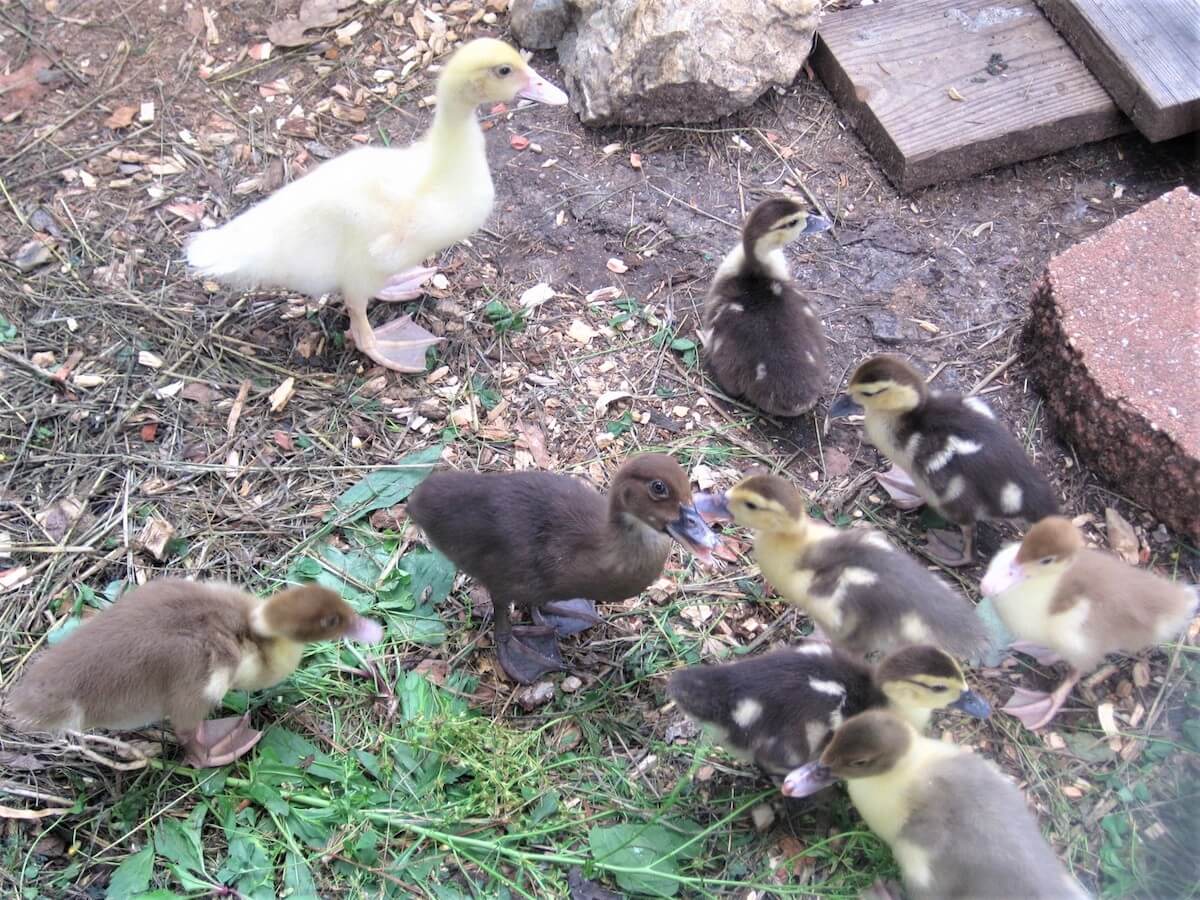
If, like me, you’re looking for more natural ways to give your ducks what they need, trust the design of wild ducks and find a way to give your domestic ducks access to the same goodness. Floating minnows in your ducks’ water bowls, tearing up hand fulls of fresh clover and other weed leaves, and just giving ducks access to plenty of forage will be sure to give them a whole host of necessary minerals and nutrients, and in far better forms than simple isolated vitamins.
What You Shouldn’t Feed Your Ducks
Keeping domestic ducks is a trusting relationship. In exchange for their flight and migratory freedom, farmyard ducks have put their trust in their keepers’ hands for providing for their needs. This means that knowing what NOT to offer ducks is just as important as knowing how to feed them.
https://www.instagram.com/p/BleCQeLAH7v/?tagged=duckfood
These foods are on the no-no list when it comes to keeping your birds healthy.
- Citrus fruits: They can interfere with shell hardness.
- Medicated chicken feed: Ducks require more food than chickens, and they can easily overdose. Additionally, ducks aren’t prone to many diseases, so the medication is unnecessary to begin with.
- Refined human junk food: Chips, cookies, cake, white-flour products, white rice, etc.You probably already know they’re bad for you—they’re just as junky for your birds.
- Lots of extra treats: Ducklings grow fast. Given too much high-protein, rich food, they may develop abnormalities like angel wing. So no matter how cute their begging peeps may be, resist the urge to reward them with unnecessary food. If you must give them something, try a handful of clover leaves—mine love nibbling them out of hand!
- Bread: I know many of us may have fond memories of going to our local park, bag of stale bread in hand. Though watching the ducks dash and dive after those white chunks of Wonderbread was fun, it wasn’t fun for the ducks’ digestive system. If you do find yourself with stale, whole-grain bread, a small amount certainly won’t kill your ducks—just consider it the same way you would a candy bar treat!
What I Feed My Ducks
I have kept both Muscovy and mallard-derived ducks (I currently have a flock of 11 Muscovy ducks, 10 of whom are still ducklings), and my approach has been on the naturally inclined end of the spectrum. I think of it in terms of “greens, grains, and grubs.”
The majority of my birds’ diets is foraged greens, largely the grasses, sedges, weeds, and legumes that cover our land. The rest of their food comes from the insects that they catch, selected kitchen scraps, birdseed, and meat.
The only supplemental feed we purchase for our waterfowl is mixed, whole-seed birdseed, which we offer on certain occasions. The meat that we offer them is a very occasional—yet much relished—element of their diet.
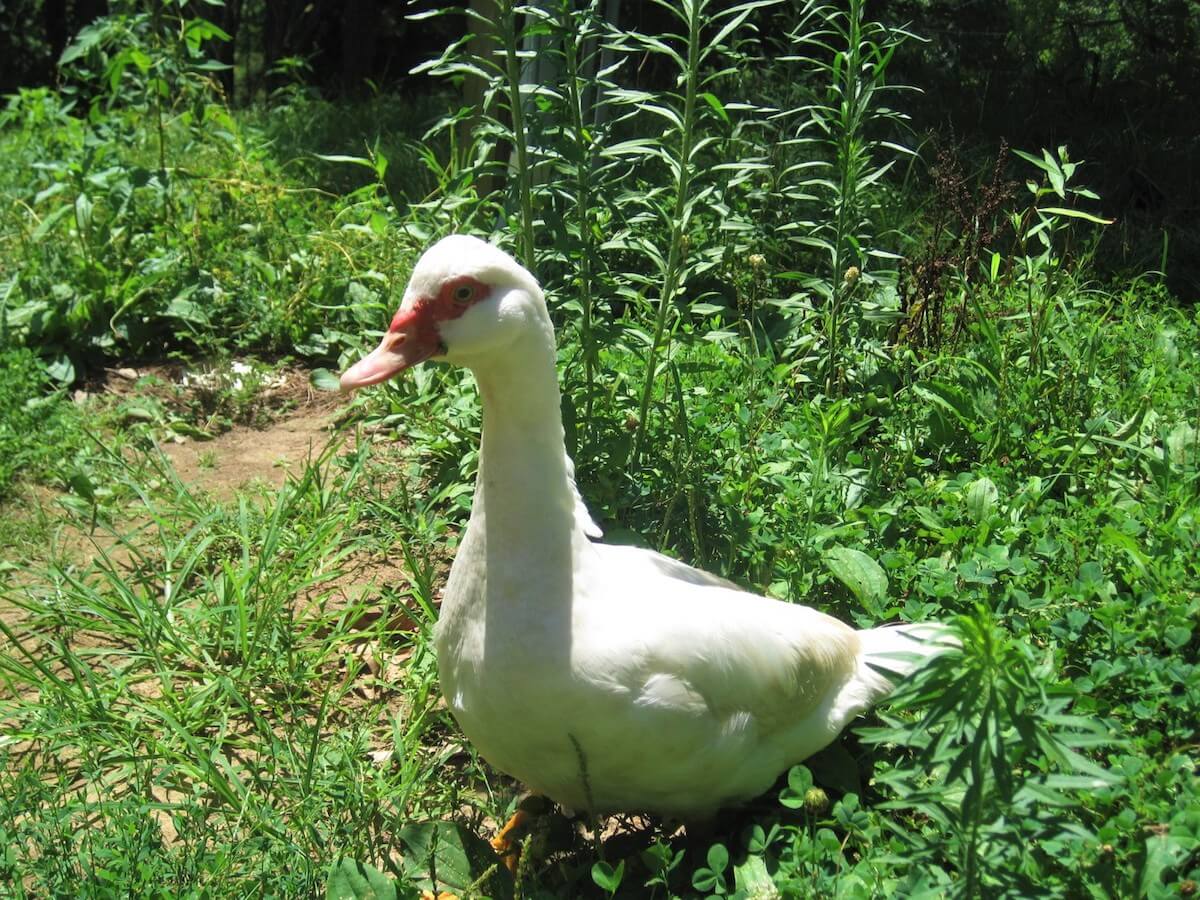
Whenever we trap a predator, such as a raccoon that ate one of our guinea fowl or the rats we catch in the barn, we mince it up finely and freeze it in measured packets. Every week or so that we happen to have it, we offer this highly concentrated source of fat, protein, and organ minerals. We have almost always noticed a growth spurt after our ducklings have had a meat feast!
The bottom line on our simple homestead is that I like letting my ducks be ducks, trying to give them the option of eating as natural a diet as their wild cousins do on the river. Though I’m currently foraging for our current ducklings, picking two 5-gallon buckets of tender weeds a day for them (a task that takes probably ten to fifteen minutes a bucket), they’ll soon be out doing it on their own!
Once the ducklings are big enough, they’ll have access to a small pond full of creepy-crawlies, fields teeming with bugs, and weeds in abundance. This approach requires decent fencing, otherwise, your neighbors may become a little too acquainted with your roaming waterfowl.
They won’t languish in the winter, either. In our relatively snow-free corner of Missouri, our ducks have feasted on fallen acorns and the still-tender bases of grasses. We give them more birdseed in the winter than in the summer (mostly to make sure that they knew to stay near!). If your area is cloaked with snow in the winter, however, you may need to forgo foraging and give your ducks all the food their wild cousins migrate for.
Keeping ducks is a simply delightful element of homestead life. Whether you keep them for meat, eggs, or for the pure delight of watching them dabble in the pond, the quacking, feathery exploits of a flock of ducklings does something good for the heart. Just be sure to do that same good for the stomachs of your birds, and you’ll be sure to enjoy many seasons of life with your bemusing flock.
Resources
- The Backyard Homestead Guide to Raising Farm Animals, edited by Gail Damerow
- What Do Ducks Eat? What to Feed Your Backyard Ducks, The Free Range Life
- What To Feed Ducks, The Spruce
- What Do Ducks Eat?, Countryside Daily
- What Do Ducks Eat? How-To and Tips for Domestic and Wild Ducks, A Life Of Heritage
- What Do Ducks Eat? No, Not Pieces of Bread. Please Read This, BirdEden
- Feeding your Backyard Ducks, The Cape Coop
- Can Chickens & Ducks Share Feed?, Hobby Farms
- The Sure Fire Way to Raise Healthy Ducklings, A Life Of Heritage
- Feeding Ducks, Poultry Keeper
- Raising Ducks: A Primer on Duck Housing, Diet and Health, HGTV


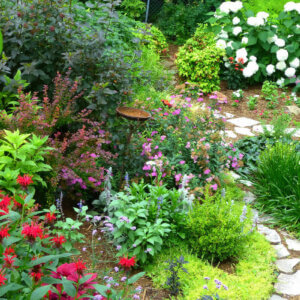
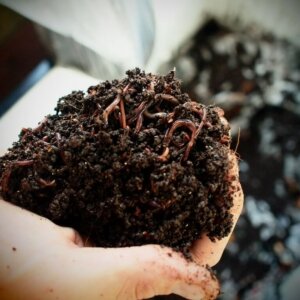
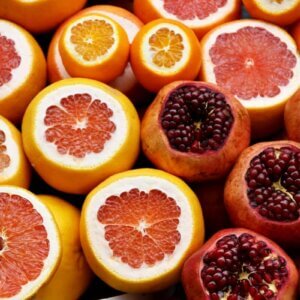
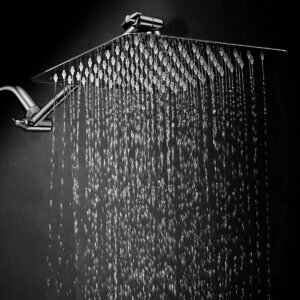
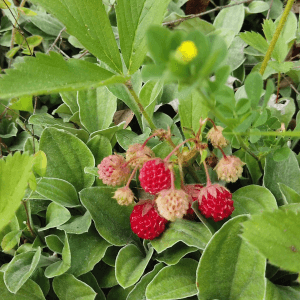
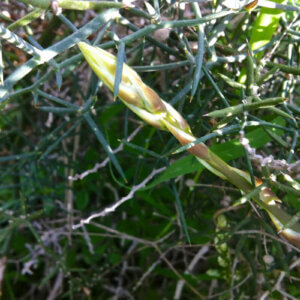



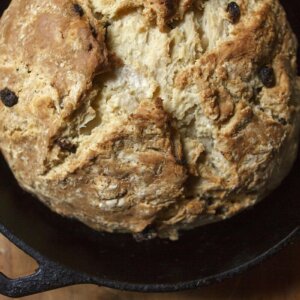
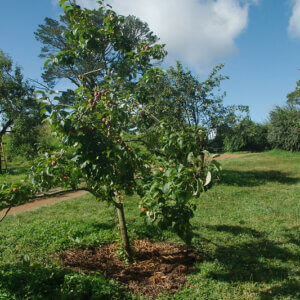
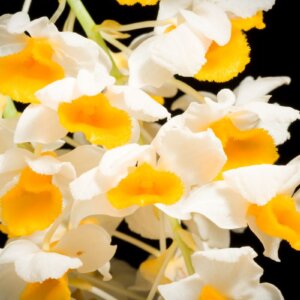
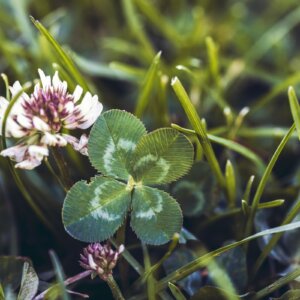
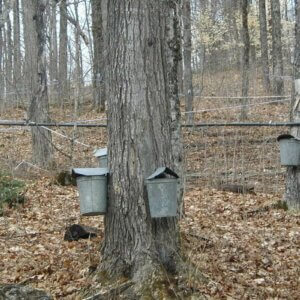
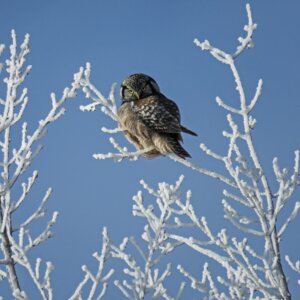

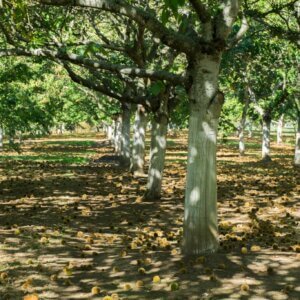
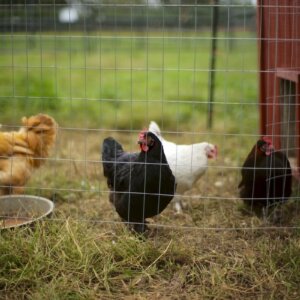

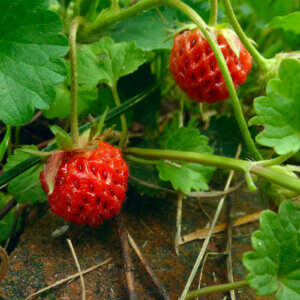

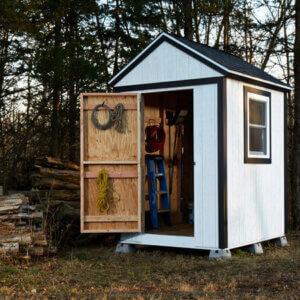
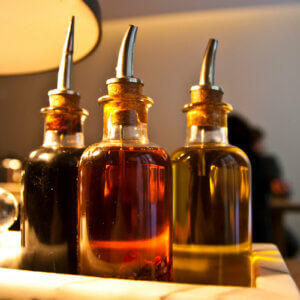
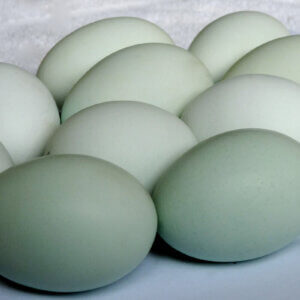

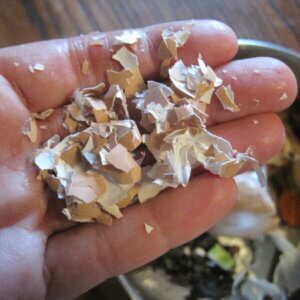
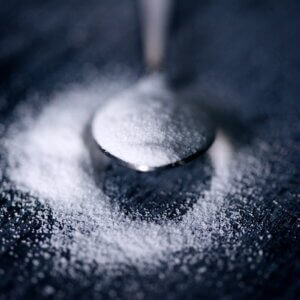
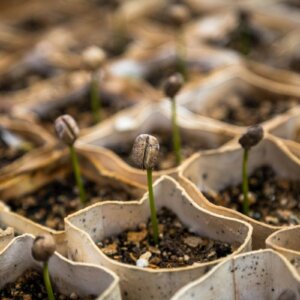
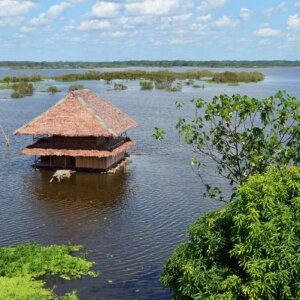
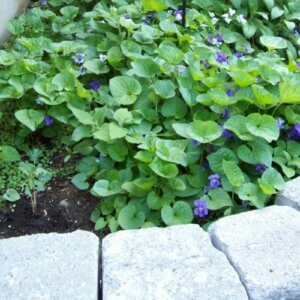
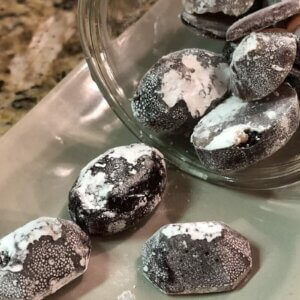
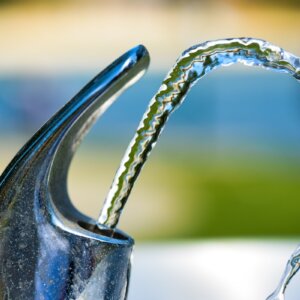

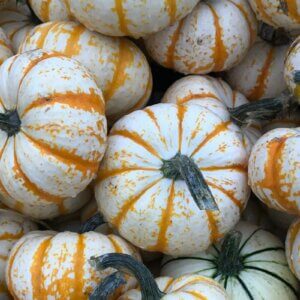

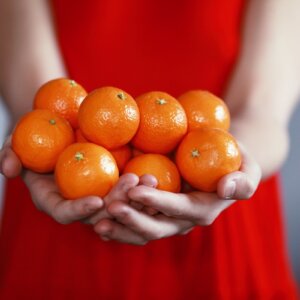
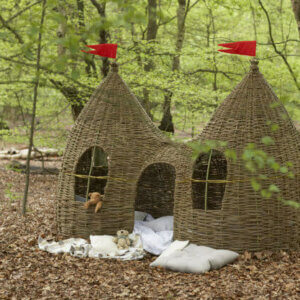
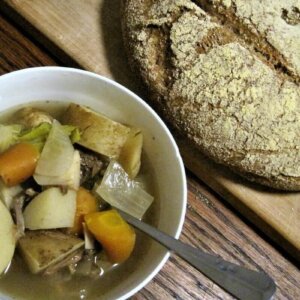
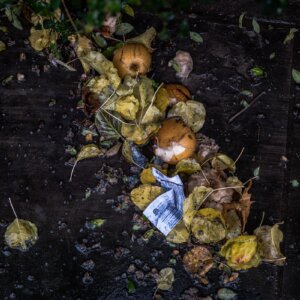
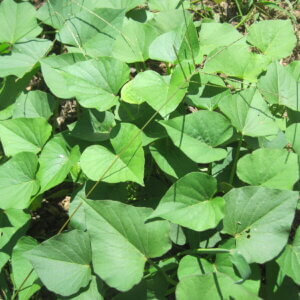
Hi,
I am a 1st time duck owner. We have 4 Pekin and 2 Appleyards. 2 Pekin and the Appleyards are a trip, but 2 of my Pekin have had some troubles. What we think is a female has the stumble like walk (are too fast) and it appears to be hard to move around. We have added Niacin to their water for the last 4 weeks. We carry her to swim and to sheltered places in the yard limiting her movement and sometime we leave her and her mate/ friend in stall.
Her friend has been fine until today. Sadly, moving him/her out of the barn yeasterday she/he flew out of my grasp and landed on her/his chest on the concrete about a 4ft fall. I immediately picked the duck up and and placed it in the pool to swim. He/she was Eating and moving around yesterday and didn’t seem to be a problem. Putting the ducks up this evening, clearly this duck is sore or injured or tired.
He/she is Still trying to preen some and did drink some water but not eating much and clearly appears to stand more than laying down. Could he/she be bruised? I checked on this couple again an hour ago. He/she looks like he/she is trying to sleep. This “not as strong” duo typically stays together as the other 4 are complete party ducks, faster, louder movers and shakers. They get their own stall.
I can keep this pair isolated for recovery and down time only making time for swim time for the next few days. Is this the recommended plan? I don’t want either to suffer. We took the first duck when hobbling badly to the vet. She received an anti inflammatory but was car sick all the way to the vet and all the way home. I felt terrible for her. I just want them to be comfortable and healthy. I don’t care if they are mover or shakers like the others. I really don’t want to put anyone down either. Avoiding another trip the vet would be ideal too expense and ultimately care for the duck.
First time duck and chicken raiser. I love them so!! They all bring me great joy.
Thank you,
Laurie
PS I appreciate your information provided. Nice site.
Hello, Laurie! I’ll give your questions my best shot.
First, I would recommend checking the stumbling duck for bumblefoot–this is a wound on the bottom of the foot pad that gets infected, swells, and affects movement. Pekins are susceptible to it.
Also, prepare your first-timer-with-ducks heart for the fact that sometimes, there are just weak ducks. Whether they’re a runt, just have somewhat poor constitution, or some other reason that can’t be known–these are the ones that would be probably eaten in the wild or die of natural causes/ for no apparent reason. I’m not sounding the death knell for your duck, by the way–obviously, she’s not in the wild and has someone to dote on her ;). I had a weaker male that I literally carried up from the pond for an entire winter (he couldn’t make it on his own) now he’s a ridiculous bruiser who you would never know had a weak season. Life with birds is funny.
For the duck that you think is hurt, just let it rest for a day or so, and it will probably recover without issue (actually, should be fine by the time you read this). Sometime, after a traumatic moment, ducks just need to “take the day off.” Just let them recoup, provide lots of water, and don’t try to fix it so much that you make it more traumatic. Example: I once accidentally hit one of my ducks with a garden hoe (she REALLY wanted the worms, apparently, and I had no idea she was behind me). She was a stumbling, closed-eye mess for a day. She rested in the duck house, keeping herself very quiet. Two days later? Full recovery–you’d never know anything had happened.
Finally, take this all in stride. Ducks are, by and large, incredibly hardy and easy-going creatures to keep. Many vet trips are unnecessary. Don’t lose the joy of these creatures by fretting and worrying–just do your best to keep them safe, clean, well-fed, and enjoy the duck party.